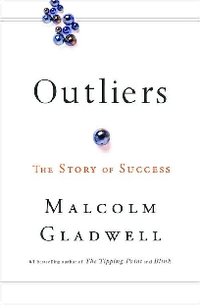I finished reading Outliers by Malcolm Gladwell a couple of days back and lots of thoughts have been churning in my head. Putting them down as a letter to myself – a letter I would write to the 20 year old Venkat whose career is just beginning ( also applicable to anyone who is in college right now ).
Hi Venkat,
How are you doing? How is your new college? Here are some tips for you.
1. Eat Breakfast.
This is not from Outliers – but my personal advice. I never ate breakfast in college – slept late, woke up late and would miss breakfast. Just by eating your breakfast daily you will get a better grade. Trust me.
2. Work hard.
You see your class topper ace in all the subjects. You think he has got an extra chunk of grey matter. Take a peek into his life – he works hard and works effectively. Takes notes in class, brushes through the chapter before coming to class, and he practices the problems. His parents taught him the right methodology to study, perhaps he had a cousin who taught him early in his school days how to present answers attractively – so he always scored higher than his peers.
Why do, on an average, Asian kids ( Singapore, Korea, Hongkong ) consistently score higher than US/European kids in Mathematics? – It is because they work hard. It takes 20 mins to an hour to crack some concepts – like fractions,probability,calculus etc. They spend that time and effort – it is in their culture to work hard. The kids from Western nations do not have the patience to understand the concept – they never get the fundamentals right – and the hatred towards Mathematics carries on. This is just a crude generalization – however – the finalists in Maths Olympiads from all the countries are all at the same level – all these kids are hard workers.
The yield from a small match box size Rice paddy field is higher than a hectare of wheat field. The rice farmer wakes up very early before the sun rises, makes sure the water level is just right, when sun comes out and water gets hot he should drain away the water, he plucks the weeds one at a time, the harvesting has to happen quick and has to be done with utmost care. Wheat on the other hand needs very little care, can be automated using large farm equipment – and yield is considerably less.
The same happens with the brain. The more effort and more energy you will spend on your brain – the more yield you will get.
Being “gifted” does not guarantee success. They have done a 20 year study on a bunch of high IQ kids in California. They followed their career. What they found is that they did not do any better than the average IQ kids.
So work hard – yes, all the proverbs about working hard are all true.
3. 10,000 hours
After you pass out of college, you will get inspired by Jimmie Hendrix and Santana – and go join a guitar class. But you will drop out after a few months. You cannot give up just like that. Any art, talent takes time. Researchers have found that it takes 10,000 hours of dedicated practice before you can become an expert. They have analyzed the school years of high school music teachers and talented artists who play in the New York Philharmonic Orchestra. The successful artists would have spent 20-30 hours every week of their school life playing their instrument.
Mozart became famous only after 10 years into his career. Beatles played 8 hours at a stretch 7 days week in a shady bar for 3 years before they became world famous. Almost all the famous authors would have produced numerous works before they would have had a best seller. Whatever profession you are choosing – put in the hours – long hours, weekends – so you can quickly reach the 10,000 hours – and then magic will happen – and success will come along with it.
So good luck on your career. Life is hard and complex – and therein lies the beauty of it. If your life is simple or easy – then it will become boring. Whenever you find that your job / career has become easy and you are not learning anything – change your job. Try to keep searching for complexity – you can enjoy life a lot.
PS : I know you are curious to know who your life partner will be – sorry the time travel protocol does not allow me to reveal that 🙂



